The Pope’s declaration on blessing irregular couples or people in irregular situations, such as same-sex couples, has ignited a mixed debate on social media platforms. Since then, misinformation and fake news have circulated on the internet, and contradictions within the church have also emerged. The document, issued by the Dicastery for the Doctrine of the Faith and approved by the Pope, states that it is possible to bless such couples without any type of ritualization or offering the impression of marriage while maintaining the integrity and coherence of the Church’s doctrine on marriage and sexuality.
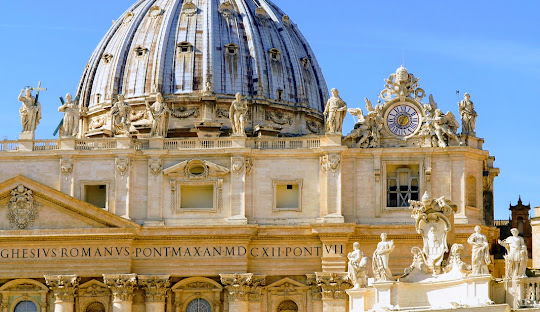
The declaration has received mixed responses from different groups and individuals, reflecting the diversity and complexity of opinions and perspectives on this sensitive and controversial topic. Some have praised the Pope’s decision as a compassionate and pastoral gesture that respects the dignity and freedom of conscience of same-sex couples, while others have criticized it as a compromise or a contradiction that undermines the Church’s teaching and identity.
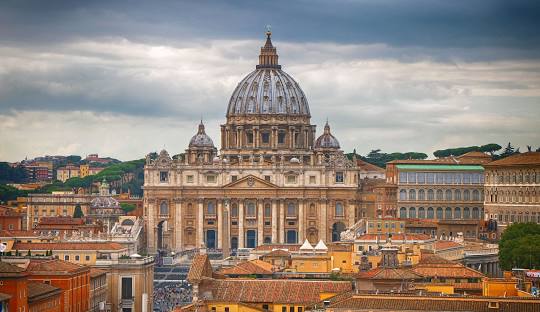
Social Media Reactions
Positive Reactions to the Pope’s Declaration
Some of the positive reactions to the Pope’s declaration have come from Catholic organizations and leaders who support the inclusion and recognition of LGBTQ+ people in the Church. For example, the Global Network of Rainbow Catholics, an international network of groups and individuals who work for pastoral care and justice for LGBTQ+ Catholics, welcomed the declaration as a “step forward” and a “sign of hope” for the LGBTQ+ community. They also expressed their gratitude to the Pope for his “pastoral sensitivity and openness to dialogue”.
Another example is Fr. James Martin, who is known for his advocacy for LGBTQ+ Catholics. He tweeted that “… I was honored to bless my friends Jason and Damian this morning in our Jesuit residence, according to the new guidelines laid out by the Vatican for same-sex couples …”. He also noted that the declaration does not change the Church’s doctrine on marriage, but rather offers a pastoral application of the existing doctrine.
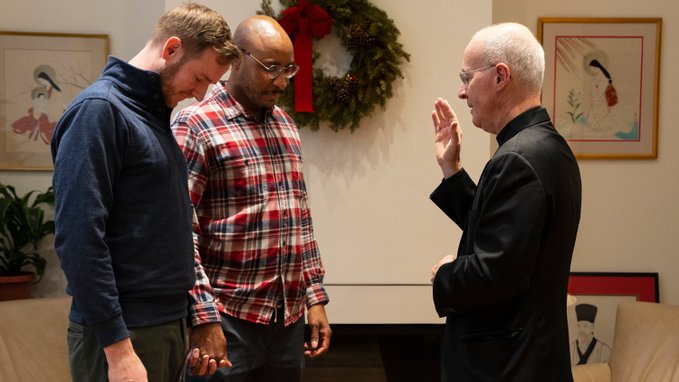
Negative Reactions to the Pope’s Declaration
Some of the negative reactions to the Pope’s declaration have come from conservative and traditionalist Catholics who oppose any change or development in the Church’s doctrine and practice regarding marriage and sexuality. Conservative bishops push back against Pope Francis on same sex blessings. Church leaders in Africa and Central Asia prohibit the practice despite Vatican approval.
Kamar’s blog posted “Pope Francis gives authorization for priests to bless marriage from the same sex like homosexuality, gay, lesbianism. What is Christianity really turning into?? HOLD MY HANDS LET’S GO TO MAMFE.” This post is misleading as the Pope did not authorise the blessing of the same sex marriage. The Dicastery for the Doctrine of the Faith issued the Declaration of “Fiducia supplicans,” which was approved by Pope Francis. The declaration allows for the possibility of blessing same-sex couples, but without any form of ritualization or creating the impression of a marriage. The doctrine regarding marriage does not change, and the blessing does not signify approval of the union.
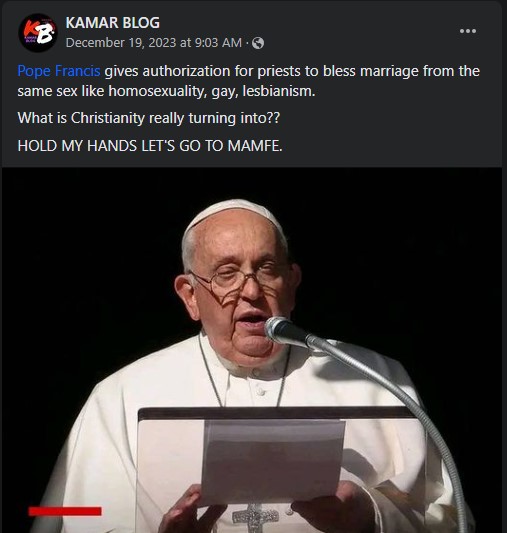
Other social media posts with similar misinformation reads “The Pope of the Roman Catholic Church has said same sex couples can be blessed in holy matrimony ( marriage). Source @BBC new #lgbt #wahvoicedey”
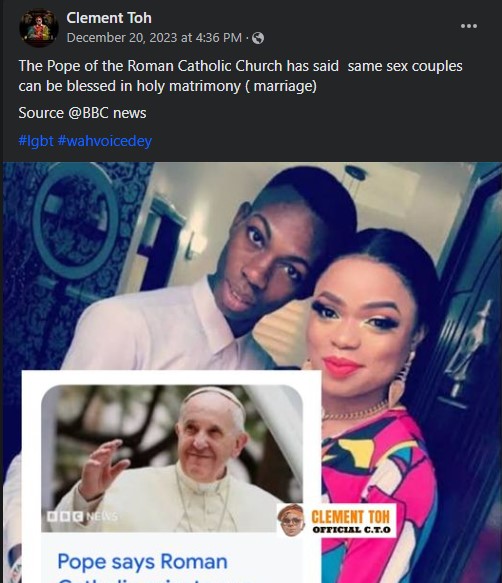
Conclusion
The Pope’s declaration on blessing couples in irregular situations has generated a heated and polarized debate on social media platforms, reflecting the diversity and complexity of opinions and perspectives on this sensitive and controversial topic. While some have applauded the Pope’s decision as a compassionate and pastoral gesture that respects the dignity and freedom of conscience of same-sex couples, others have condemned it as a compromise or a contradiction that undermines the Church’s teaching and identity. The declaration also raises questions and challenges for the implementation and reception of the Pope’s pastoral vision in different cultural and ecclesial contexts.

